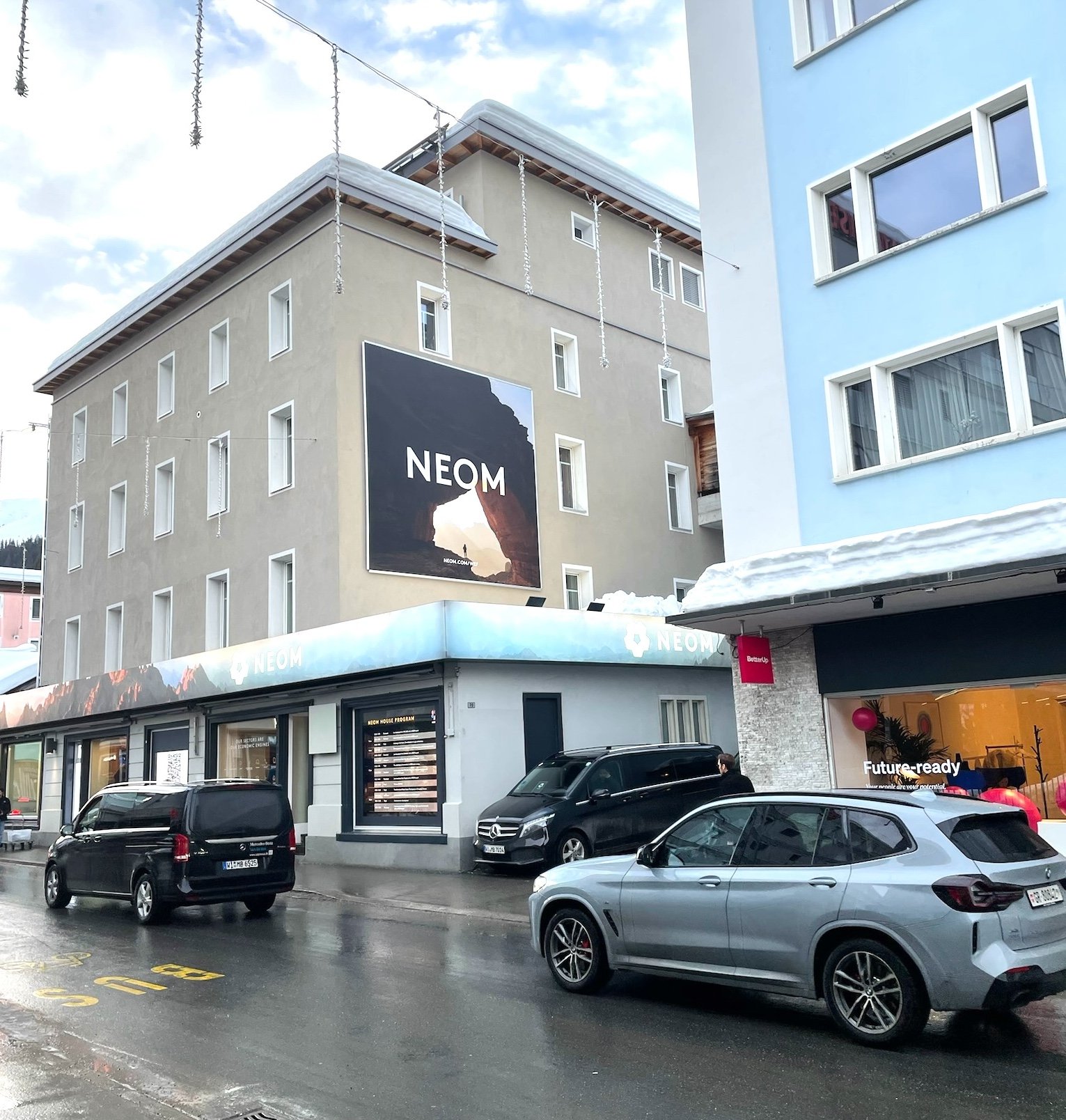
OHK's Strategic Insights from the
2024 Davos Economic Forum
Takeaways from the 2024 Davos Economic Forum: Key Observations on AI, Economic Growth, NEOM’s Ascent and Sustainability in a Shifting Global Landscape
In its seventh year at the World Economic Forum in Davos, OHK has once again engaged in a pivotal dialogue with global leaders and thinkers. This year’s theme, “Rebuilding Trust,” resonates deeply with OHK’s ethos and strategic vision. Amidst a backdrop of societal divides and uncertain economic landscapes, the forum presents an invaluable opportunity for OHK to glean insights, share expertise, and collaborate on solutions for pressing global issues. As OHK navigated the buzzing corridors of the forum, it was evident that the discussions were intensely focused on the theme of trust-building, emphasizing its significance in the evolving geopolitical and economic realities of our times. The following sections provide an overview of key observations and insights gathered by OHK during the event, highlighting our analytical perspective on various critical global topics.
Reading Time: 6 min.
NEOM at 2024 World Economic Forum in Davos: The Visionary Genesis and Evolution of NEOM – Charting Our Role in Its Ascent to Global Urban Development Prominence
Ahmed Al-Okelly, a partner at OHK, holds a distinctive place in the architectural and urban development landscape of Saudi Arabia, particularly for his pioneering role in conceptualizing NEOM. In the early 2000s, under the direct appointment of the Saudi Royal Family, he embarked on a groundbreaking journey during King Abdullah's reign. His vision was to create something unprecedented, a beacon of innovation and progress in the region. NEOM was not just another city project; it was an ambitious endeavor to set a new benchmark in city planning and sustainable living. The concept hinged on harnessing cutting-edge technology and eco-friendly practices to create a futuristic urban environment— a city that would not only be a hub for technological advancements but also a model of sustainable living, blending seamlessly with its natural surroundings. NEOM was remarkably ahead of its time. Its realization by the Saudi government, however, did not occur until almost a decade later, during King Salman's reign. The contemporary work being executed in NEOM has its roots deeply embedded in the foundational ideas laid out in the early plans and concepts which set the stage for the later development of NEOM, guiding its transformation into the groundbreaking project it is today. The photo depicting NEOM's presence in Davos was gratifying to see on the world stage, showcasing the project's global significance and impact.
The 2024 World Economic Forum in Davos unfolded under the critical theme of "Rebuilding Trust," showcasing a unique convergence of global minds. The week in Davos was a deep dive into some of the most pressing global opportunities and challenges. Conversations revolved around five pivotal areas: AI's impact, the future of talent, India's growth trajectory, energy transition, and the macroeconomic outlook for 2024. This year's forum was notably busier, a mirror to the urgency and complexity of today's global challenges.
In every conversation and panel OHK attended, the underlying current was about how to rebuild and strengthen trust – whether it was in governments, international corporations, technologies like AI, or global economic systems. The urgent need to restore faith in these institutions and systems was a response to the growing societal divides and uncertainties affecting our world. The emphasis was on how creating a foundation of trust is essential for effective cooperation and progress in this interconnected world. In essence, the 2024 Davos Forum was not just a gathering of global leaders and thinkers but a concerted effort to address the trust deficit in various sectors. The theme of "Rebuilding Trust" acted as a guiding principle, shaping conversations and potential solutions to navigate the complex challenges of our era.
Technology at the Forefront: AI as the Trust Rebuilder and a People-First Approach to Bridging the Gap
In the contemporary landscape of technology, the theme of "Rebuilding Trust" acquires a significant and nuanced interpretation, especially in the context of Artificial Intelligence (AI). AI has emerged not merely as a technological innovation but as a pivotal force driving economic and societal advancement. Its role extends beyond the confines of tech-centric discussions, positioning itself at the heart of trust-building in the digital era. The core challenge with AI lies in harmonizing its vast potential with the imperative need for transparency and authenticity. As AI systems become more integrated into various aspects of life and business, ensuring they operate in a trustworthy manner becomes paramount. This involves creating AI solutions that are not only efficient and innovative but also responsible and understandable to the users. The focus is on leveraging AI's capabilities to enhance human endeavors while consciously addressing the ethical and practical concerns that accompany its deployment. The goal is to ensure AI acts as a boon, enriching lives and societies, rather than becoming a bane due to a lack of trust or understanding. This delicate balance requires continuous dialogue, ethical AI design, and governance frameworks that prioritize trust as a fundamental component in the evolution of AI technologies.
The ongoing technological revolution, spearheaded by advancements in AI, is fundamentally transforming the global workplace. With an estimated 40% of jobs worldwide now influenced by AI, the landscape of work is undergoing a seismic shift. This profound change presents a dual-edged sword of challenges and opportunities. On one hand, there's the looming challenge of skill redundancy and job displacement; on the other, there’s the opportunity for new job creation and innovation. The urgency of the situation lies in the growing demand for a workforce that is not only technologically proficient but also equipped to handle AI responsibly and sustainably. The rapid pace of AI integration across industries means that the skills required yesterday are evolving faster than ever before. It's not just about understanding AI technology; it's about applying it ethically and innovatively to solve real-world problems. Institutions, governmental, educational, and corporate, play a pivotal role in this transition. They must prioritize a forward-thinking approach that focuses on transparency, ensuring that the workforce is informed and prepared for the changes AI brings. This involves retraining and upskilling initiatives that are not just reactive but proactive, anticipating the future needs of the AI-driven economy. A people-first approach is critical in this transformation. It’s about nurturing a culture where continuous learning is encouraged and supported, and where employees are empowered to adapt and grow with the changing technological landscape. This approach also involves creating inclusive work environments where diversity in skills and perspectives is valued, fostering innovation and creativity.
India's Ascent: Emerging as a Global Economic Powerhouse
India's pronounced presence at the Davos forum was more than a display of its economic ambitions; it was a declaration of its rapidly growing influence on the global stage. Poised to become the world's third-largest economy, India's trajectory is underpinned by a combination of strategic governance, technological innovation, and the vibrancy of its youth. These factors coalesce to create a dynamic environment ripe for significant economic transformation and growth. Central to India's ascent is its focus on technological innovation. The country has made remarkable progress in developing its digital infrastructure, which is a cornerstone for modern economies. This progress is evident in the widespread adoption of digital technologies across various sectors, enhancing efficiency and accessibility. India's digital transformation is not just limited to urban centers but is also reaching rural areas, bridging the digital divide and opening new economic opportunities. Moreover, India's commitment to clean energy and sustainability is a crucial aspect of its economic strategy. The country is rapidly advancing in the development and deployment of renewable energy sources, particularly solar and wind energy. This shift towards clean energy is not only environmentally significant but also positions India as a leader in sustainable economic development. The youthful demographic of India plays a pivotal role in its economic rise. With one of the largest populations of young people in the world, India has a vast pool of human capital. This demographic advantage, coupled with increasing educational and skill development initiatives, equips the country with a workforce ready to meet the demands of a modern, technology-driven economy.
Urgent Energy Transition: The Crucial Role of the Financial Sector
As the world grapples with the intensifying effects of climate change, the need for an urgent and comprehensive energy transition becomes increasingly clear. In this critical journey towards a sustainable future, financial institutions emerge as pivotal players. Their role in funding and driving the shift towards clean energy is not just a business imperative but a global responsibility. The challenge, however, extends beyond mere investment—it's about accelerating the transition while responsibly managing the environmental and social impacts, particularly in developing countries where the effects are most pronounced. Financial institutions have the power to influence the direction and pace of the energy transition through their investment choices. By allocating capital towards renewable energy projects such as wind, solar, and hydroelectric power, these institutions can significantly impact the reduction of carbon emissions. This shift in investment strategy is not only beneficial for the environment but also aligns with the growing demand for sustainable and responsible investment options among consumers and investors. Moreover, the role of financial institutions is crucial in bridging the funding gap for clean energy projects, especially in emerging economies. These regions often face the dual challenge of limited access to capital and the greatest impacts of climate change. By providing necessary funding and financial expertise, financial institutions can enable these countries to leapfrog to cleaner, more sustainable energy solutions, thereby contributing to global efforts to combat climate change.
2024's Economic Horizon: Navigating Through Uncertainty with Cautious Optimism
As we cast our gaze upon the economic landscape of 2024, it's clear that the global economy is treading a path of cautious optimism amidst prevailing uncertainties. The previous year, 2023, was a close call with recessionary forces, but the world economy managed to skirt around it, setting a course towards gradual recovery. This resilience, however, does not overshadow the complexities and challenges that lie ahead. Geopolitical tensions, internal political dynamics, and global market fluctuations continue to weave a tapestry of uncertainty, making predictions about the future increasingly difficult. Despite these challenges, there are emerging signs of positive growth on the horizon. Key economies around the globe are gearing up to play substantial roles in this recovery phase. One of the primary drivers of this anticipated growth is a renewed focus on boosting consumer consumption and invigorating the housing market. These sectors are critical engines of economic activity, and their revival could signify a broader upturn in economic fortunes. The efforts to stimulate consumption are multifaceted, involving policy interventions, monetary stimulus measures, and targeted support to key industries. Governments and central banks are working in tandem to create conducive environments for consumer spending. This includes measures such as lowering interest rates to make borrowing more attractive and implementing fiscal policies designed to increase disposable income for households. In parallel, the housing market is receiving special attention. A robust housing market can have far-reaching effects on the economy, given its interconnectedness with various sectors, from construction and real estate to banking and retail. Stimulating housing demand involves not just making credit more accessible but also addressing underlying issues such as housing affordability and inventory levels.
Davos Reflections: A Mixed Bag for 2024. The discussions at Davos reflect a mix of cautious optimism and acknowledgment of a complex global landscape. The week in Davos was a deep dive into some of the most pressing global opportunities and challenges. Conversations revolved around five pivotal areas: AI's impact, the future of talent, India's growth trajectory, energy transition, and the macroeconomic outlook for 2024.
The focus is on leveraging AI's capabilities to enhance human endeavors while consciously addressing the ethical and practical concerns that accompany its deployment. The goal is to ensure AI acts as a boon, enriching lives and societies, rather than becoming a bane due to a lack of trust or understanding. This delicate balance requires continuous dialogue, ethical AI design, and governance frameworks that prioritize trust as a fundamental component in the evolution of AI technologies. In sum, bridging the AI skill gap is a multi-faceted challenge that requires concerted efforts from educational institutions, businesses, and governments. By focusing on transparency, retraining, ethical understanding, and a people-first strategy, we can prepare the workforce for the AI-driven future, ensuring that the technological revolution benefits society as a whole. By prioritizing investments in clean energy and considering the broader environmental and social impacts, financial institutions can play a significant role in mitigating the effects of climate change and paving the way for a more sustainable and resilient global economy. As 2024 unfolds, the global economy appears to be embracing a narrative of cautious optimism. While the shadow of uncertainty remains, there is a collective effort to steer towards growth and stability. The focus on stimulating key economic sectors, coupled with strategic policy interventions, suggests a proactive approach to managing the complexities of the global economic landscape.
OHK's presence in Davos, now approaching a decade, has seen its projects garner spotlight intermittently. This year, our team's involvement in Saudi Arabia's NEOM project is at the forefront. To learn more about how we assist governments in advancing their economic agendas and building anchor projects that reshape urban landscapes and growth realities, contact us to learn more about this work.







